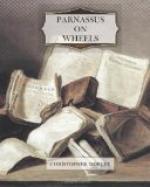Peg drew Parnassus along the backward road with a merry little rumble. I think she knew we were going back to the Professor. Bock careered mightily along the wayside. And I had much time for thinking. On the whole, I was glad; for I had much to ponder. An adventure that had started as a mere lark or whim had now become for me the very gist of life itself. I was fanciful, I guess, and as romantic as a young hen, but by the bones of George Eliot, I’m sorry for the woman that never has a chance to be fanciful. Mifflin was in jail; aye, but he might have been dead and—unrecognizable! My heart refused to be altogether sad. I was on my way to deliver him from durance vile. There seemed a kinship between the season and myself, I mused, seeing the goldenrod turning bronze and droopy along the way. Here was I, in the full fruition of womanhood, on the verge of my decline into autumn, and lo! by the grace of God, I had found my man, my master. He had touched me with his own fire and courage. I didn’t care what happened to Andrew, or to Sabine Farm, or to anything else in the world. Here were my hearth and my home—Parnassus, or wherever Roger should pitch his tent. I dreamed of crossing the Brooklyn Bridge with him at dusk, watching the skyscrapers etched against a burning sky. I believed in calling things by their true names. Ink is ink, even if the bottle is marked “commercial fluid.” I didn’t try to blink the fact that I was in love. In fact, I gloried in it. As Parnassus rolled along the road, and the scarlet maple leaves eddied gently down in the blue October air, I made up a kind of chant which I called
Hymn for a Middle-Aged Woman (Fat)
Who Has Fallen into Love
O God, I thank Thee who sent this great adventure my way! I am grateful to have come out of the barren land of spinsterhood, seeing the glory of a love greater than myself. I thank Thee for teaching me that mixing, and kneading, and baking are not all that life holds for me. Even if he doesn’t love me, God, I shall always be his.
I was crooning some such babble as this to myself when, near Woodbridge, I came upon a big, shiny motor car stranded by the roadside. Several people, evidently intelligent and well-to-do, sat under a tree while their chauffeur fussed with a tire. I was so absorbed in my own thoughts that I think I should have gone by without paying them much heed, but suddenly I remembered the Professor’s creed—to preach the gospel of books in and out of season. Sunday or no Sunday, I thought I could best honour Mifflin by acting on his own principle. I pulled up by the side of the road.
I noticed the people turn to one another in a kind of surprise, and whisper something. There was an elderly man with a lean, hard-worked face; a stout woman, evidently his wife; and two young girls and a man in golfing clothes. Somehow the face of the older man seemed familiar. I wondered whether he were some literary friend of Andrew’s whose photo I had seen.




